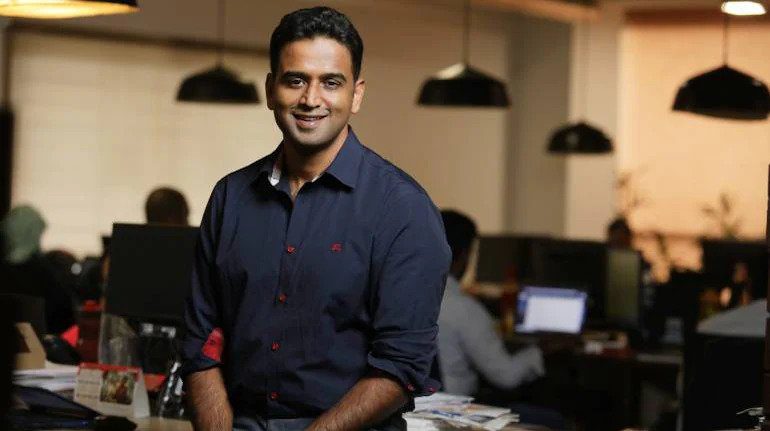(September 7, 2021) He was all of 17 when he was first introduced to the world of finance and trading. Rather taken in by the whole concept of trading, Nithin Kamath spent the next 12 years doing just that. By the time he had graduated from engineering college, he’d earned a sizeable amount of wealth… only to lose it all soon after. Refusing to give up, he soldiered on and continued to trade during the day and worked at a call center during the nights. The tide finally turned when he met a high net worth individual who handed him a cheque and asked him to manage his money.
So, we just got our in-principle approval for our AMC (MF) license. I guess now comes the hard part. https://t.co/g35YH60ksC
— Nithin Kamath (@Nithin0dha) September 1, 2021
By 2010, he’d garnered enough confidence and funds to launch his own startup – Zerodha, a retail online stock broking company – in association with his brother Nikhil. Ever since, the startup has been changing the way young India invests in stocks. The Bengaluru-headquartered company offers retail and institutional brokerage, currencies and commodities trading, mutual funds, and bonds. With an active client base of over 3.5 million, Zerodha is the largest retail stockbroker in India, beating even traditional brokerage firms such as ICICI Securities and HDFC Securities. In 2020 Zerodha became one of the rare profitable fintech companies to attain unicorn status and the 42-year-old Nithin made his debut on the Forbes list of India’s 100 richest. His net worth is estimated at $1.55 billion.

Nithin and Nikhil Kamath founded Zerodha
Journey to the top
Born in a Konkani family in Shivamogga, Nithin was raised in Bengaluru by a veena teacher mother and a Canara Bank manager father. Growing up in a neighborhood filled with active traders, Nithin was first initiated into stock broking at the age of 17. He was rather taken in by the whole system of making money through stocks and soon realized that he had a penchant for it too. He began actively trading ever since and continued to do so through his college years Bangalore Institute of Technology. By the time he’d graduated he’d earned a handsome profit. But that’s when things went south.

Zerodha in its early days; Nithin Kamath (extreme left)
He’d borrowed money to trade and ended up blowing his trading account and lost a lot of money. To make up for the debt he took up a call center job that he worked at for four years even as he continued to trade during the day. On his website, Nithin writes, “I quit my job when I met the first person who asked me to manage their portfolio.”
By 2006, he had become a franchisee of brokerage firm Reliance Money to start a formal advisory business. Around this time, he was joined by his brother Nikhil, who Nithin claims is a better trader than he was. With Nikhil handling trading, Nithin figured he could set aside some time to build a brokerage firm that they wanted. When the markets crashed in 2008, several people suffered heavy losses, but Nithin had managed to make some money. By 2010, the brothers took the plunge and set up Zerodha.
Hustling to succeed
The idea for the startup came about when Nithin felt the need for a platform that offered people a seamless trading experience. He also believed that people needed a platform to educate them on the different investment options available. “With Zerodha, we were the first to introduce a flat fee model (a maximum of ₹20 per trade), helping traders save upto 90% of brokerage charges compared to the exorbitant percentage fees which was common at the time,” Nithin writes on his website, “In addition, we offered this single pricing plan to all our clients unlike the then incumbent players who had opaque offerings for different groups of clients. While we started from zero, this transparency slowly got us attention on online communities and via word of mouth.”
The operations which initially focused on day traders have now evolved to cater to long-term investors. The company began as a completely bootstrapped venture and has so far not required any external funding; it has been thriving despite the pandemic with people making a conscious effort to begin their investment journeys in these uncertain times. The platform has seen a 100% growth in concurrent users and won the NSE Retail Broker of the Year in 2018.
In addition to this, Nithin and Nikhil also founded investment management firm True Beacon which is aimed at ultra-high net worth investors and operates on a zero-fee model.
Giving Back
To empower retail traders and investors, Zerodha runs a number of open online educational and community initiatives. Varsity, is a learning module to educate young investors looking to explore the world of trading; it also has an active forum (Trading Q&A) for traders and investors to discuss stock ideas.
Our focus at @RainmatterOrg is to help create green jobs, livelihoods & help preserve the environment using sustainable agri practices. In that journey, we're super delighted to join @madhuchandansc & @organicmandya on their mission to change farming & improve lives of farmers1/8 pic.twitter.com/2lidyVWpJw
— Nithin Kamath (@Nithin0dha) September 3, 2021
In January 2021, Nithin Kamath set up the Rainmatter Foundation for which he set aside $100 million. The Foundation supports grassroots individuals and organizations working on solutions for climate change. A special emphasis is also laid on afforestation and ecological restoration activities. In an interview with YourStory, Nithin said, “I have had a problem with the concentration of wealth, where a small bunch of people have access to a high amount of wealth. It is time that these people do something to give back to society.”



